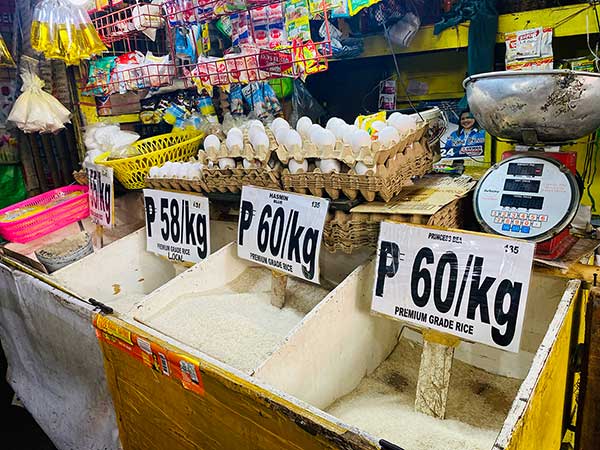
By Mariela Angella Oladive
Senator Imee Marcos, sister of President Ferdinand “Bongbong” Marcos Jr., has weighed in on the government’s initiative to reduce rice prices to below P30/kg in select regions by July 2024.
During a press briefing on May 10 in Barotac Nuevo, Iloilo, Senator Marcos expressed skepticism about discussing specific numbers, which she believes might create false hopes.
“I don’t want to talk about numbers because it’s just giving false hopes. It’s difficult if unfulfilled since citizens really demand accountability. My only concern is to significantly lower the price,” she said.
Marcos highlighted Iloilo’s role as a major rice-growing area severely affected by El Niño and proposed establishing a government-set minimum buying price for each planting season to support local farmers and ensure price stability.
“This minimum [buying price] should be sufficient to cover the production cost so that farmers do not suffer losses and should also be discussed with the consumer to ensure that retail price markups are not excessive,” she explained.
Additionally, Marcos raised concerns about the implementation of the Rice Tariffication Law (RTL) and suggested a need for reform in the National Food Authority’s (NFA) role.
“We are going to hopefully restore the regulatory functions of the president so that during emergencies, like this El Niño, the president can authorize government-to-government imports,” she said.
The debate over reducing rice prices to P30 per kilo or even below gained traction following a congressional hearing on May 6, which led to an agreement among key officials, including House Speaker Ferdinand Romualdez and Agriculture Secretary Francisco Tiu Laurel.
Identified loopholes in the RTL’s implementation prompted collaborative efforts between the legislative and executive branches.
The plan includes empowering the NFA to sell affordable rice through KADIWA centers, aiming to gradually increase the number of centers nationwide with support from local government units.
Romualdez has committed to expediting the process, targeting the passage of amendments before the congressional break on May 25.
Marcos underscored the need for a comprehensive review of the NFA, citing past issues with importation and accountability.
She pointed to the recent suspension of 139 NFA employees by the Ombudsman as indicative of systemic problems within the agency.
Moreover, Marcos discussed issues such as excessive profits by middlemen and cartels in storage facilities, which adversely impact both farmers and consumers.
She stressed the importance of improving post-harvest processes to minimize losses, advocating for expanded milling and solar drying technologies.
“If we can retrieve even half [of 23 percent lost to inadequate drying], it would be a big boon to our supply,” she reasoned.
To address these challenges, the senator proposed the establishment of a larger oversight body to monitor various aspects of the rice industry, including government importations and retail selling.
Additionally, she advocated for greater involvement of LGUs and cooperatives in direct purchasing from farmers to bypass middlemen and ensure fair prices for all stakeholders.
In contrast, the Philippine Statistics Authority (PSA) has projected continued high rice prices until July, citing a rice inflation rate of 24.4% in March 2024, the fastest in 15 years. PSA chief Claire Dennis Mapa attributed this to a low base effect seen in early 2023, indicating a strong increase in rice inflation until July unless market interventions are implemented.
In March 2024, the average price of regular milled rice was P51.11 per kilogram, up from P39.90/kg in March 2023. Well-milled rice also increased, averaging P56.44/kg compared to P44.23/kg year-on-year. Special rice climbed to P64.75/kg from P54/kg in the same period the previous year.
MIXED REACTIONS
Daily Guardian reached out to various rice stakeholders in Iloilo, who expressed mixed opinions on the feasibility and potential impacts of lowering rice prices.
Manong Toto, a seasoned rice vendor with over two decades of experience at Lapaz Public Market, voiced skepticism about the likelihood of the proposed price reduction materializing. He drew parallels with past promises of a P20/kg rice, noting that none were fulfilled.
Toto highlighted the challenges faced by vendors like himself, mentioning the significant markups imposed on rice before it reaches the market. Recounting his experience, he emphasized the unlikelihood of a substantial price decrease given the current market dynamics, particularly with the rampant rice imports.
Pio, a farmer with 45 years of experience from a town in Iloilo’s 4th district, expressed concerns about potential losses for farmers if prices drop too low. He explained that if farm inputs, such as fertilizers and chemicals, remain expensive while rice prices plummet, farmers would face financial difficulties.
Pio highlighted the need for a balance between affordable rice for consumers and sustainable livelihoods for farmers, pointing out the challenges posed by inflation and stagnant farm input prices.
“Malugi ang farmers if muna ka nubo, the tendency is sa humay pa lang nubo na bakal daan. If nubo sa humay pa lang for sure lugi kami, kay ang abono, bulong kag pangabudlay namo indi mabawi,” Pio emphasized. [Farmers will incur losses if prices drop too low, as we tend to buy inputs like fertilizer and pesticides early on. If we buy these inputs early and prices drop afterward, farmers will definitely suffer losses because we won’t be able to recover the costs of the inputs, labor, and other expenses.]
Ray, a father of two and former employee in a small private company, shared a consumer’s perspective on the matter. He emphasized that while a reduction in rice prices would benefit low-income households, there are uncertainties about whether such measures will materialize.
“Maayo kon matupa, maayo man kon indi,” Ray remarked. [Better if it materializes, but if not, then it is what it is.]


















